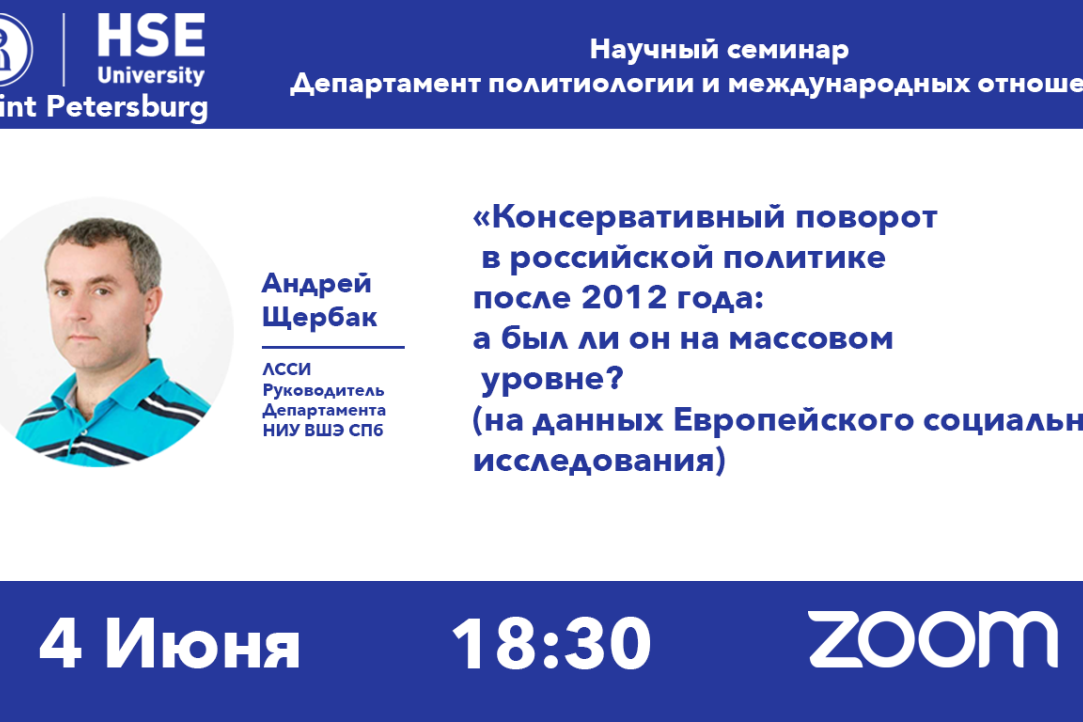- A
- A
- A
- ABC
- ABC
- ABC
- А
- А
- А
- А
- А
- HSE Campus in St. Petersburg
- Saint-Petersburg School of Social Sciences
- Department of Political Science and International Affairs
- News
- The Department of Political Science and International Relations invites you to take part in the Research Seminar, which will be held on Friday, June 4, 2021 at 6.30 pm (MSK).
-
Departament
- About the Department
- Faculty and Staff
-
Annual Conference “The October Readings”
-
More About the Conference
-
Upcoming Conference
-
Archive
-
-
Academic Seminar
-
Upcoming seminars
-
Previous Seminars
-
198068 Saint Petersburg
Griboyedov channel embankment, 123, Room 324
t. +7 (812) 644-59-11, plus 61415
The Department was created on the basis of the Department of Politics, which was established in 2005. The main purpose of the department is to provide today’s students with professional training in the fields of political analysis and sociopolitical engineering, as well as in creating a special creative atmosphere that allows for the formation and development of a society of political experts who are capable of not only carrying out professional research, but also proposing and implementing solutions to relevant Russian and international problems.
 Federalism and Decentralization in Africa. Globalization and Fragmentation in Territorial Arrangements
Federalism and Decentralization in Africa. Globalization and Fragmentation in Territorial Arrangements
Issaev L., Захаров А. А.
Springer, 2024.
Клещенко Л. Л.
Вестник Волгоградского государственного университета. Серия 4: История. Регионоведение. Международные отношения. 2024. Vol. 29. No. 1. P. 77-86.
Korotayev A., Issaev L., Anna I. et al.
In bk.: Terrorism and Political Contention. New Perspectives on North Africa and the Sahel Region. Springer, 2024. P. 169-194.
OxonCourts Judicial Studies Graduate Colloquium. OxonCourts Judicial Studies Graduate Colloquium. University of Oxford, 2019

The Department of Political Science and International Relations invites you to take part in the Research Seminar, which will be held on Friday, June 4, 2021 at 6.30 pm (MSK).

Dear colleagues,
We are pleased to invite you to a Research Seminar of the Department of Political Science and International Relations, which will be held on Friday, June 4, 2021 at 6.30 pm (MSK) .
Speaker: Andrey Shcherbak (LCSR, Head of the Department of Political Science and International Relations, Higher School of Economics, Saint Petersburg, Russia).
Title: Russia’s “Conservative Turn” after 2012: Evidence from the European Social Survey
Department of Political Science and International Relations
Research Seminar
Russia’s “Conservative Turn” after 2012: Evidence from the European Social Survey
June 4, 2021 | 18.30
ZOOM
Russian politics is often described as having taken a “conservative turn” since the start of Putin’s third term. This refers to the rise in the political influence of the Russian Orthodox Church, the ideological shift to traditional values, and the growth of authoritarianism. This study aims to explore ordinary Russians’ commitment to this conservatism using data from European Social Survey, 2010-2018. I suggest a four-factor model for measuring popular conservatism in Russia: Loyalism, Conformity, Religiosity, and Traditionalism/Security. I then reveal a surge in conservative attitudes in 2014-2016 and a steady decline thereafter. Finally, I explore the factors that explain conservatism on the individual level. I conclude that the “conservative turn” policy has only been a partial success due to a mismatch between official discourse and popular attitudes.
Working languages: Russian / English.
Seminar will be online via Zoom.
The link to join Zoom: https://zoom.us/j/97331495641?pwd=MUJjUzc2L1dVK3RoOFZnRWZQYTFKdz09
Meeting ID: 973 3149 5641
Password: 723168
If you have questions please contact Stanislav Shkel (sshkel@hse.ru ).
-
https://elearning.hse.ru/en/mooc/
Massive Open Online Courses
-
https://www.hse.ru/en/visual/
HSE Site for the Visually Impaired
-
http://5top100.com/
Russian Academic Excellence Project 5-100
- © HSE University 1993–2024 Contacts Copyright Privacy Policy Site Map
- Edit

